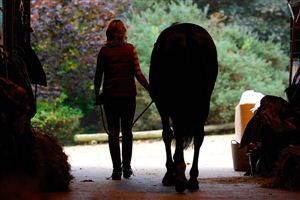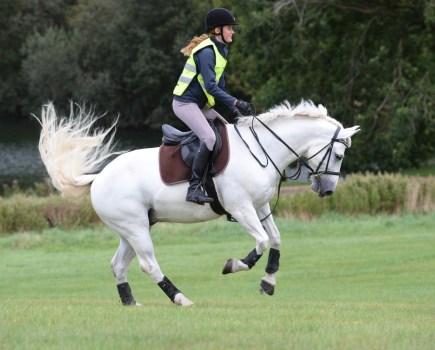Loss of confidence doesn’t have to come from a crashing fall – the general ups and downs of life also take their toll on our self-esteem, energy levels and motivation, all of which affect our ability as riders.
 Becky Chapman, a senior biomechanics coach and sports psychologist, runs Confident Rider Workshops at Ashen Equestrian Centre in Suffolk, with Peter Doherty, life coach, hypnotherapist and NLP Trainer www.the-confident-equestrian.co.uk
Becky Chapman, a senior biomechanics coach and sports psychologist, runs Confident Rider Workshops at Ashen Equestrian Centre in Suffolk, with Peter Doherty, life coach, hypnotherapist and NLP Trainer www.the-confident-equestrian.co.uk
The way life is going is reflected in your riding, and vice-versa. There are real parallels between our riding and our present levels of self worth, energy, confidence and motivation. When things are going badly, it might not just be a question of ‘not riding well’ but many of the professionals we consult may not be aware of the underlying issues. After all, riding instructors are not trained counsellors. Although they should be aware of their clients’ emotional issues to some degree, they are trained to look at things from the horse’s point of view. As professionals, they also have a high degree of confidence and competence, which can make it hard for them to empathise.
I recommend the following tips for riders heading for a crisis of confidence:
– Acknowledge each ridden session as a success even if you don’t achieve exactly what you hoped for. Look for the positive and see where progress has been made. Even if it’s only in very small increments, it means you’re getting there! Riding and training horses is a long-term process, so recognise you are in it for the long haul and be prepared to enjoy the journey, rather than focusing on the end result.
– Don’t micromanage your riding life. Look at the broad overview of whether you and your horse are happy and healthy, for example, rather than the fact you didn’t qualify for something. Take the pressure off yourself and you’ll take it off your horse – you may be surprised at the positive results in every aspect of your life that come from this simple decision.
– Be prepared for your goals to age and evolve as you do. Like nightclubs and loud music, what you enjoyed as a teenager isn’t necessarily going to attract you in middle age, so don’t see it as a failure when you hang up your cross-country silks.
Simulating success
Becky is one of several top trainers who uses a riding simulator to help clients to a better understanding of where they could develop greater competence and confidence.
“The feedback that Strider the Simulator gives is invaluable,” she says. “Using him, we can analyse the physical reasons why riders feel unsafe, insecure or out of control, and give scientific reasons for why this is happening as well as teaching them how to change. As well as giving feedback about where riders are going wrong, Strider shows them the many things they’re doing right, and they recognise they’re not actually as bad as they thought they were, and that all the issues they have can be addressed.”
Personality
You don’t automatically start life as a confident rider, but some personality types are more risk averse than others. Knowing your strengths and weaknesses in this area can help you in your riding.
“A rider doesn’t have to have a horse-induced hospital experience to lose confidence,” says Becky. “A crashing fall might make it easier for others to understand why you’ve lost confidence, but doesn’t necessarily leave the rider with a bigger confidence problem than someone who’s had a minor scare. We have techniques to help all riders address their issues, whatever they might be, and enjoy their riding again.”








